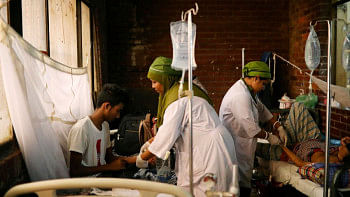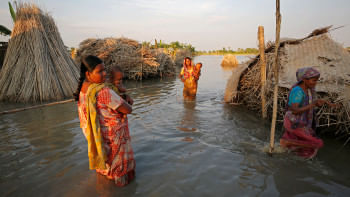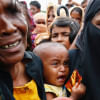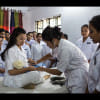The critical role of midwives in ensuring maternal health

When a pregnant woman arrived at a Rohingya refugee healthcare facility in Cox's Bazar, bleeding profusely and nearing death, it was midwife Rokhsana, trained with support from the United Nations Population Fund (UNFPA), who helped save her life. Rokhsana and her team stabilised the patient's condition and arranged a hospital referral for a life-saving blood transfusion. "My journey is fuelled by a simple but powerful belief," Rokhsana says. "No mother should ever have to fear childbirth. I am committed to ensuring that every birth is a moment of joy and not a moment of sorrow."
Each year, on May 5, we celebrate the International Day of the Midwife, a moment to honour midwives around the world who provide critical care across communities. Midwives are specialised healthcare professionals who can deliver around 90 percent of essential sexual, reproductive, maternal, newborn, and adolescent healthcare services, including services for survivors of gender-based violence (GBV). Their role is indispensable.
In Bangladesh, midwifery care has played a key role in achieving a 79 percent reduction in maternal mortality since 2000, as recently reported by UN agencies. Since 2010, the Bangladesh government has made significant strides in integrating midwives into the national healthcare system. Today, the country is recognised as one of six champion countries in the global Midwifery Accelerator initiative. Yet, it still faces a considerable gap: while an estimated 25,000 midwives are required to meet the needs of women and girls, fewer than 3,000 have been deployed to date.
A recent study shows that further scaling up midwifery services in Bangladesh could save over 31,000 additional maternal and newborn lives by 2035. The evidence is clear: midwives save lives. But their impact goes far beyond delivery rooms.
Midwives frequently serve on the front lines during crises, as seen in Bangladesh, one of the world's most climate- and disaster-vulnerable countries. The rising frequency of emergencies disproportionately affects women, girls, and gender-diverse individuals, limiting access to sexual and reproductive health services. Midwives ensure continued access to safe delivery, family planning, and response to GBV in even the most challenging settings.
In May 2024, Cyclone Remal devastated parts of the Mongla upazila, including Sonakhali village. There, nine-month pregnant Swapna, 29, faced a precarious situation. Fortunately, midwife Nazmin, stationed at a nearby UNFPA-supported facility, quickly assessed her high-risk condition, arranged a referral, and provided a cash voucher to cover transport. "When I came to this facility, I just prayed to Allah that I could serve the women and girls for whom I was appointed," Nazmin recalled. "Without the midwife's support, our story could have ended tragically," said Swapna's husband. "Thanks to her, our baby is safe and healthy."
Nazmin's working conditions were far from easy. Upon arrival, she found the healthcare facility damaged, with spalling cement, no water supply, and a community unsure of her role. "At first, the local community didn't accept the facility as a place to safely give birth," she explained. But she didn't give up. Nazmin worked with local health workers and volunteers to build trust. With support from health service managers, she began offering delivery services, eventually conducting 27 normal births in just three months. Her story is a testament to the resilience, trust, and professional dedication that midwives bring to communities across Bangladesh.
Midwifery is also a sector for sound economic investment. Every $1 invested in midwives delivers $16 in economic and social returns. However, the deployment of midwives in Bangladesh remains painstakingly slow. Shrinking international resources and recent cuts in official development assistance threaten the progress already made.
We know what works. Midwives are at the heart of the solution. But training midwives is not enough. They must be deployed, equipped, supported, and protected. Without investing in midwives, we cannot improve the quality of maternity care or end preventable maternal deaths.
Now is the time for the government and donors to step up and accelerate the midwifery gains already made. Every delay puts lives at risk—investing in midwives is investing in the health and future of women and newborns. With strategic investment, stronger policies, and community engagement, Bangladesh can ensure that every woman, regardless of location or circumstance, has access to life-saving midwifery care.
Masaki Watabe is representative ad interim for the United Nations Population Fund (UNFPA) in Bangladesh.
Views expressed in this article are the author's own.
Follow The Daily Star Opinion on Facebook for the latest opinions, commentaries and analyses by experts and professionals. To contribute your article or letter to The Daily Star Opinion, see our guidelines for submission.

 For all latest news, follow The Daily Star's Google News channel.
For all latest news, follow The Daily Star's Google News channel. 









Comments